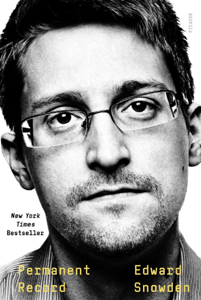 Edward Snowden, Permanent Record (New York: Metropolitan Books, 2019), 339pp.
Edward Snowden, Permanent Record (New York: Metropolitan Books, 2019), 339pp.
Edward Snowden (born 1983) will always be remembered for a singular brave or brazen act. In May of 2013, he flew to Hong Kong, where he documented to the journalists Laura Poitras and Glenn Greenwald how the United States' NSA (and partner countries) operated a vast, secretive, and unimaginably powerful system of mass surveillance that was unaccountable to any judicial warrants, public or congressional oversight, and that flagrantly violated the Constitution (cf. the Fourth Amendment). In effect, the American government was digitally spying on anyone it wanted, through its "bulk collection" of data and metadata, including spying on at least 35 world leaders like Angela Merkel.
Apart from the legal, political, and ethical ramifications of such mass surveillance, for Snowden this was first and foremost a radical subversion of the norms of a liberal, democratic society. And so whereas he has been called many things — a traitor, leaker, dissident, spy, and scapegoat, he considers himself a patriotic whistle blower. That's why he released his book on September 17, 2019, which happens to be Constitution Day. Indeed, he notes that "America was born from an act of treason" against England's oppressive government of that day. And its first whistle blower act of 1778 didn't just honor acts of principled dissent, it "enshrined such acts as duties."
In this memoir Snowden explains how and why he forfeited his successful career, left his family, risked a lifetime of imprisonment, and has lived in exile in Moscow for seven years (about the same period of time that he worked for the NSA and CIA). A high school dropout his sophomore year, he earned his GED that same year. A computer prodigy, by age 22 he had earned the country's highest top secret security clearance. That gave him unparalleled access to the country's most powerful surveillance programs.
"Deep in a tunnel under a pineapple field, I sat at a terminal from which I had practically unlimited access to the communications of nearly every man, woman, and child on earth who'd ever dialed a phone or touched a computer." And again: "It was, simply put, the closest thing to science fiction I've ever seen in science fact: an interface that allows you to type in pretty much anyone's address, telephone number, or IP address, and then basically go through the recent history of their online activity. In some cases you could even play back recordings of their online sessions, so that the screen you'd be looking at was their screen, whatever was on their desktop."
Snowden has been charged with theft of government property, and two further charges under the 1917 Espionage Act. On the day that this book was released, the American government also charged him with violating non-disclosure agreements that he had signed with the federal government. His disclosures have generated extensive public debates about national security and individual privacy. In early 2016, Snowden became the president of the Freedom of the Press Foundation, a San Francisco-based organization whose purpose is to protect journalists from hacking and government surveillance. For the movie version of this drama, see the documentary Citizenfour.
Finally, a technological footnote. First, this story of mass surveillance is more than seven years old. Nor does it consider mass surveillance and data collection by companies like Facebook, Google, Amazon, and Apple. The week that I read Snowden's book, Google made two public announcements. First, device chief Rick Osterloh said that anyone with a smart device like Nest or Amazon Echo should advise their house guests that their conversations were being recorded (and that he does so for his own guests). Second, in the October 23, 2019 edition of Nature, Google said their quantum computer called Sycamore solved a particularly difficult problem in 200 seconds. It also claimed that the world’s current fastest classical computer, IBM's Summit, would take 10,000 years to solve that same problem. The experts debate these claims pro and con, but this gives you an idea of the power of computing today, compared to seven years ago, and how that could be used for surveillance.
Dan Clendenin: dan@journeywithjesus.net


